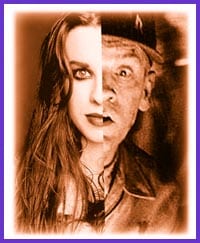Distilled down to their essentials, this season’s films – many were faves at the recent Toronto International Film Festival – dwell on the same issue: identity.
It’s a fin de siècle omelette; the eggs have been cracked, whipped and scrambled. Religion, politics and race are standard fare, but a spicey, new flavour is the result of adding gender to the mix.
The mainstream servings are Istvan Szabo’s Sunshine (a religious, political morality play), Régis Wargnier’s Est-Ouest (a dystopia in Stalinist Russia), James Toback’s Black And White (being black versus acting black), and Damien O’Donnell’s East Is East (Pakistani family values meet British cultural overload).
Other filmmakers go deeper into gender and sexuality for more intimate and visceral answers. There is Kevin Smith’s Dogma (where casting God as a woman changes everything, such as turning the immaculate conception into a cosmic turkey baster), Spike Jonez’ Being John Malkovich (last year’s multiple reality motif made flesh), David Fincher’s Fight Club (a brutally satiric deconstruction of the male psyche), Deb Pierce’s Boys Don’t Cry (a Pyrrhic victory of identity), Lukas Moodyson’s Show Me Love (a coming of age lesbian love story from the land of Ikea) and Jamie Babbit’s But I’m A Cheerleader (a Dr Laura wet dream turned nightmare).
Why gender-play now?
It could just be an element of shock erotica – a viable mechanism of putting bums in theatre seats. Or perhaps it’s because gender-playing is bucking its historical outlaw status. (It’s all a matter for Monday morning did-you-see-that-movie? debates.)
But zeitgeist is as the zeitgeist does. Gump meets Pat Robertson.
Dogma, a handily constructed bit of blasphemy, comes at a time when it is chic to target the church. (In a Globe And Mail article on the highly controversial Sensation exhibit at The Brooklyn Museum Of Art, art historian Roger Kimball labels anti-Catholicism as the anti-Semitism of intellectuals.)
The film kicks off with pot shots at the structure of the religion, with Milwaukee standing in for hell (not exactly a conceptual stretch), and then, moving its way up the belief food chain, by selecting a woman who works in an abortion clinic as the saviour of humanity. George Carlin is a priest and Rufus, the 13th apostle, is played by Chris Rock, who gleefully announces that Christ is black.
By this point the film has worked itself into a sacrilegious froth. With a final homocentric towel snap, God appears as a lesbian. Okay, fine, a female diety… who manages to impregnate another woman. (Of course, director Kevin Smith demurs on this point: “I’ll not be the one who says God is a lesbian,” he says. “I’m in enough trouble already.”) While The Catholic League in the US can’t figure out where to picket first, Dogma is not so much a nihilistic indictment of belief as a cautionary experiment in how identity-tampering can hit 9.5 on the social Richter scale.
Even riskier than Dogma is Being John Malkovich. It plays the surreal as everyday, reeling in bizarre concepts and serving them up as easily digested menu items. While the film is best served cold and un-Roger Eberted, the premise circles around the notion of a portal allowing anyone to enter the mind of John Malkovich for 15 minutes. Time for your close-up, Mr Warhol.
Initially, what is tantamount to a carnival ride becomes a point of rebirth for Lotte (Cameron Diaz), who uses Malkovich’s body to metaphorically seduce Maxine (Catherine Keener), something both characters want, but neither can contemplate directly. The film’s surreality, comedy included, puts the fluidity of gender into a corporeal state.
While the emotions were easy to play, the who’s-in-whose body aspect of the story sent Diaz and Keener back to the script on a regular basis. In the understanding of self, the most telling scene, and certainly the most astounding, is when Malkovich goes inside himself. What he finds is what you’d expect to find if you took a tour inside yourself – but it still comes as a shock. And the shock explains why “knowing thyself” is a tidy phrase, but a bitch of a task.
The film’s producer, Michael Stipe (of REM fame) says: “This movie begs the questions, ‘What are we? Who are we? How separate are we from the next?’ Questions of gender and question of identity.”
Put plainly, these films, particularly so many at once, could not have been made 20 years ago. The directors of each agree they wouldn’t have found the backers, they wouldn’t have found the distributors, and they wouldn’t have found an audience. La Cage aux Folles they ain’t.
This new batch of films tackle gender identity questions with integrity and nuance. In Boys Don’t Cry, when Brandon Teena is discovered to be a female posing as a male, one of her assailants asks why she just can’t be a dyke. “Because I’m not a dyke,” Brandon tries to explain without success. The answers are not simple. Biology does not always become biography.
While it is not the role of cinema to provide answers, the mere presence of so many asking the same questions is a comfort to the rest of us, alone in the urban wildness, asking who the hell am I?

 Why you can trust Xtra
Why you can trust Xtra


